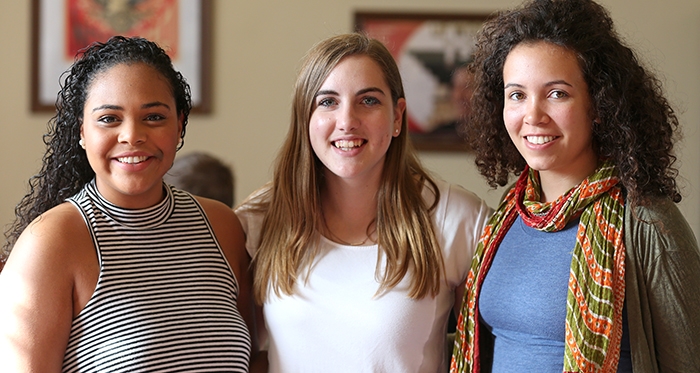Every Thursday, in the Unity Lounge of Reamer Campus Center, students gather over lunch for conversation that can run the gamut from collegial to contentious.
This is Identity Dialogues, a student-run series which explores the dynamic and complex aspects of identity in a safe and open forum. Topics range from cultural (mis)appropriation to skin color to millennial sex lives. Attendance can range from 3 to 30.
Among the more popular recent topics: What is white? LGBTQ identity. Interracial relationships. Hair and identity. Sessions can get lively, such as a recent discussion over the sensitivity of Halloween costumes.
But they can also be supportive. At an ID on Muslim identity, a student was sharing the particulars of his lifestyle, which he said was at times at odds with his religious beliefs. Other students offered comparisons to themselves and their beliefs.
“The goal is to break down stereotypes and to have an open space to talk about personal identity and experience,” said Maya Whalen-Kipp ’16, who organizes this year’s IDs with Mayte Martinez ’18, Antonia “Toni” Batha ’17 and Andrew Guyatte ’17.
“Sometimes we can foster a conversation that would not happen otherwise,” she adds. “This is a personal space and therefore we have a lot of personal stories and truths that come out [here] that there is not another place for [on campus].”
Organizers gather to determine the theme of each week’s session. Sometimes a topic will be generated by current events, on- or off-campus. Other times the organizers will ask the leaders of a campus group to suggest a topic and help moderate discussion.
The organizers ask participants—nearly all students, except for an occasional faculty, staff or guest—to keep what is shared at ID within the room. “We want people to feel comfortable to share their tories because where else can they do that?” Whalen-Kipp asks.
“Sometimes it does get very ‘preacher to the choir,’ but I’m totally OK with that,” she said. “Sometimes I think the choir needs a place to preach and we provide that space.”
Jason Benitez, director of multicultural affairs, says that it is significant that Identity Dialogues is an independent volunteer program run by students for students. “The students really own this and take pride in offering these conversations,” he said. “This is not a recognized club with a budget on campus. It is purely students volunteering time because they are passionate about the initiative.”
“ID offers a space to discuss topics that are otherwise not widely talked about,” said Benitez. “So, passions and emotions can run high, but constructive dialogue is always the goal.”
Benitez cites ID as one of two programs that promote “safe discomfort” as a way to create greater understanding. The other is Dinner and Discussion Around Diversity, also known as DDD.
DDD
Regulars of DDD talk about Tuesday nights as the highlight of their week, good take-out food from one of Schenectady’s restaurants coupled with an unusual opportunity to explore with others a spiritual or ethical question from a variety of perspectives.
Each week a student leader selects a question, researches and records answers from differing perspectives and then facilitates the conversation.
Questions have included:
- How important are sexual beliefs/restrictions in your faith/spirituality?
- Does God influence your choice of profession (or weekend activities)?
- Is there a place for truth in interfaith dialogue?
- What is forgiveness?
- Is humanity inherently good or evil?
At a DDD session last fall, students and staff explored the question, “How do we make decisions?” The leader presented passages from the Christian, Jewish, Islamic and atheist/agnostic perspectives, and the conversation took flight, eventually coming around to a topic with which students identify: activism.
“Do we have an obligation to be activists?” a student asked. “The opposite of activism is apathy. So if you’re not apathetic, that’s a step in the right direction.”
DDD began in 1999 as “Dinner, Devotion and Discussion,” sponsored by the Campus Protestant Ministry that included scripture readings and a brief reflection from Campus Protestant Minister Viki Brooks. Over several years, scripture was replaced by articles on contemporary religious questions, and students took over most of the leadership, Brooks said.
“We try to create a culture of respect for difference and a culture of care in our time together,” Brooks said. “It is my hope that the skill of deeply listening to one with whom you disagree will help students as they enter the next phase of their learning, be it a work place situation or graduate school.”
There is no typical student who attends DDD, Brooks said. But those who are drawn to this program are interested in the search for meaning in a unique way. “They value the exchange of ideas that allows them to draw on their personal experience in equal measure to their intellectual life,” she said.
Changing culture
Student culture has changed in the past decade or so, according to Gretchel Hathaway, chief diversity officer, with students more engaged in learning about other perspectives on local, national and global issues.
Each year, Hathaway’s office surveys the student body to determine programming and policy changes. After a spring 2014 survey, for example, Union added more events in response to student requests for opportunities to share on topics like religion, race and LGBTQ issues, she said.
“Students are much more willing to dialogue about challenging issues and to share their stories if they have safe venues to express their thoughts,” she said.
They are also more engaged in social justice issues, organizing vigils and rallies around a number of recent events including the 2014 police shooting of Michael Brown in Ferguson, Mo., the murder by extremists of 147 students at Garissa University College in Kenya last April, and the shooting of three Muslim students at UNC—Chapel Hill last February.
“We are a small but vibrant campus,” she said, “and we listen to our students to address issues so that Union College is welcoming to all in our community.”

